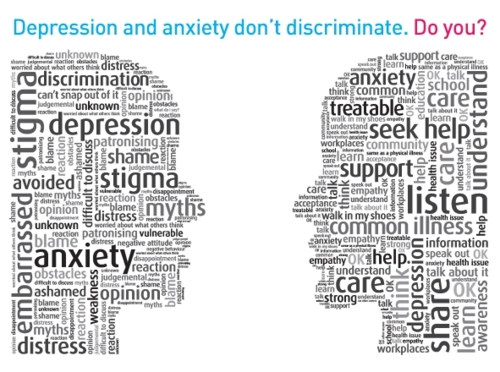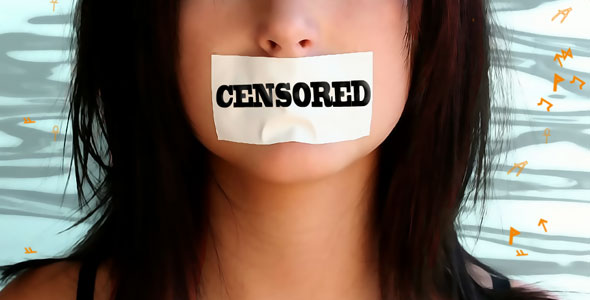
Source: Pinterest
“I searched for a common goal amongst humankind, to which all would agree to strive for excellence. I have not found anything other than the vanquishing of anxiety [hamm]” – Ibn Hazm (d. AH), famous Andalusian scholar of Islam.
The recent spate of deaths by suicide within the Maldivian community, both at home and abroad has sparked off the debate concerning illnesses of the mental health variety which includes depression, anxiety etc. and associated symptoms. While debate of this kind is healthy because it gives room for people to open up about their struggles concerning mental health issues, certain comments by authorities and public alike tends to do more harm than good. These statements often stem out of ignorance of what mental health issues are about, the root causes that drives them, and how at the end of the day it is the inadequacies of the government of the day that is on prominent display when all is said and done.
Linking and associating mental health disorders solely on one’s religiousness or irreligiousness as some put it, is one of the aspects of what I am talking about. While Maldives is constitutionally a 100% Islamic nation, where politicians spew rhetoric on a regular basis trying to portray a picture of harmony, peace and stability in the country, the truth is far from it. Underneath all the fairy tales that the government conjures up lies a country that is deeply divided on many central issues related to the government, governance itself, the political system, religion, and not to mention the fissures and divides that exists as deep wounds over what some call as the Male’-Raajjethere divide.
Developmental policies since the beginning of President Maumoon Abdul Gayyoom’s time which spanned a period of 30 years before he stepped down in 2008 after losing the first multi-party presidential elections that was held, is a pivotal reason behind the social inequities and imbalances that exists in the country even today. Factor in a coup that toppled a people elected government in 2012 and the upheaval that followed, the Presidential elections of 2013 which was “won” through the Supreme Court of Maldives, the incumbent regime in existence is merely following up and “expanding” on the groundbreaking policies laid by the now President Yameen Abdul Gayyoom’s half-brother himself.
Under President Maumoon’s leadership, the people that he wanted to keep close were fed from the state coffers and as a result got richer and more affluent, while the poor remained more or less at a level where they struggled to make ends meet; in a status of state controlled poverty, being thankful for the “generous” handouts that were given from the Presidential Palace or the President’s Office at the time.
President Maumoon practiced the art of the “benevolent and kind” leader that was generous to those that did not come into conflict with him about his policies and many atrocities. Those that did, bore the brunt of it, either being “reeducated” at the prisons that were notorious then for torture, death and prisoners that were often talked about to have gone missing.
It was President Maumoon’s developmental policies that saw the capital Male’ “developed” as a concrete city of national pride and prosperity while far lying atolls and islands got scraps and pieces of the developmental aid that poured into the country from left and right during his reign. A half constructed jetty here and there, a single storey building as a school on another and a less than adequately equipped health center somewhere else. In the meantime, “Atholhuge” or short-stay residences for visiting government officials were setup in islands considered as the “capitals” within the atolls, with every luxury that could be afforded at the time.
Meanwhile, people were forced to migrate to the greater Male’ that constitutes now of Male’, Vilingili and Hulhumale’, all designed to centralize power, which in the end meant easier control over the masses that the presidency ruled over. Families fell into hardship trying to make ends meet, living in small cramped spaces in the capital paying exorbitant amounts of money for rent, because there exists no rent control mechanisms enforced by the government on land owners even up till today. These families left behind spacious and airy homes in their islands where they could have led a more physically and mentally well rounded life, just because they wanted to give their children a chance at getting a better education and later on perhaps a better future than the ones they were stuck with.
In the islands, the eldest sons often were forced to leave school halfway through secondary education or even before in order to make ends meet in the family, forced to work at a far lying resort somewhere, getting to see their parents, wives and children when the resort management deemed it fit. With no Employment Act in existence, with rights of the employees not guaranteed by law, many employees were left floundering within a system that saw little need in taking a more holistic approach towards the needs of employees.
It is no surprise then that many families that lived within the crowded Male’ city ended up being prime examples of broken homes. No one needs to go into details on how lack of intimacy in a marriage between the husband and wife brings on physical and emotional imbalances to the relationship, how these wounds can fester and explode into messy and ofttimes ugly divorces, leaving behind children scarred and hollowed out by the resultant effect.
When one talks about mental health issues, it is often closely linked to one’s childhood, the effects of perhaps long forgotten traumatic experiences that lingers somewhere in the mind to manifest in uglier ways. One could be totally in control of their lives one minute and sweating over a perceived danger to their very existence the next. The mind after all has a “mind” of its own and it is seldom easy under the circumstances to control its various thought processes and the negative emotions that can arise out of the chemical imbalances that sets in.
There is also the hereditary factor to consider, some studies pointing to a link between depression and a polymorphism in the serotonin transporter gene SLC6A4 which is known as 5-HTTLPR. A 2003 study found that the presence of this particular 5-HTTPLR increased risk of depression, but only for those who also experienced life stressors or trauma, which perhaps points towards traumatic childhood experiences.
Suicide and genetics on the other hand, according to a recently published Q&A article on MayoClinic attests to the fact that it is a complicated association. While research has shown that there is a genetic component to suicide, it is alluded that there are other contributing factors that increases an individual’s risk. What complicates matters further when it comes to the link is a process called epigenetics, the process via which certain genes are turned on or off as a person grows and develops, which can be once again influenced by what happens in a person’s environment. Meaning that once again, childhood factors could play a significant role here.
When people so carelessly point towards mental illnesses and suicide as being caused by lack of faith or one’s lack of closeness to Allah SWT, they fail to take into consideration the stress under which most of the families live when it comes to the heavenly paradise on Earth that is known as the Maldives. A paradise for those that visits its luxury resorts and gets the five-star treatment worth the exorbitant amounts charged, little of this wealth which if at all trickles down to the people.
The income inequalities, social injustices that exists deep rooted within society, the lack of a comprehensive and fair justice system that protects the rights of everyone, especially the most vulnerable; children, mothers and fathers collectively, the lack of adequate support systems that takes over when these institutions fail to uphold their duties effectively, the failure of consecutive governments to nurture a broad based civil society that addresses inadequacies in policies and their implementation that affects social and economic factors are all at play here.
Lack of a comprehensive mental healthcare framework is one of the crucial issues that is faced not only in Maldives, but in well developed countries where the problems are just as profound. In fact, studies carried out have shown that suicide rates are higher in wealthier nations than in poorer countries, and that accessibility to care is a great hindrance to overall mental health of patients that requires treatment for different associated symptoms.
The patient to doctor ratio is crucial when it comes to mental health care systems, the exhaustion that creeps up on professionals without a proper backup system in place which could prove to be detrimental. These are all issues that adds onto an already complex and wicked problem that needs targeted solutions from a government that somehow cannot seem to be able to fathom the multifaceted nature of the issue. From affordability of care to access, to the removal of stigma that surrounds the issue, there needs to be massive transformational movements within and across different spectrums of society to address the issue of mental healthcare and what it constitutes.
Being a practicing Muslim, I cannot deny the role that spiritual wellbeing plays when it comes to mental health issues. For me, religion is very much a part of who I am. It even defines me to a certain point. While prayers and recitation of Qura’n has helped me immensely when it comes to coping with the worst of my symptoms, for others, religion might not hold such a profound value in their lives. For those that do not believe in religion and existence of a higher power, there exists other mechanisms such as meditation which to a certain extent mimics the effects of prayer.
When government ministers point towards lack of religious faith as the main reason behind poor mental health status of large swathes of the population across the country, they fail to understand that this lack of faith as they call it also stems from poor governmental policies on education. Fact that religion serves as a tool that is manipulated at the behest of the government of the day does little to instill faith in a generation that has come to question everything that is in existence and beyond.
Gone are the generations that says yes to everything a ruler imposes upon them. In place now are groups of individuals that question; questions that needs to be answered adequately by learned professionals in terms of religious discourse, especially by people who have the patience to deal with them.
Islam as a subject should be taught by teachers who can bring forth lively discussions and engage students in debates surrounding central issues to society in an Islamic context. Rather than shying away from debates as such, teachers should help and guide students to understand what Islamic literature has to say on important pillars that governs society and life of individuals. Subject matter should touch deeply on aspects of tawh’eed (oneness of Allah SWT), and what it actually means when one says that Islam is a way of life.
Without incorporating these multi-dimensional aspects that addresses the wellbeing of a society as actionable policies on the ground, when officials open their mouth to belittle an issue that is of paramount importance not just locally but globally, it actually brings to light the lack of awareness and knowledge of these officials when it comes to broad based issues that needs targeted solutions that cuts across government and non-governmental platforms in existence.
“Wellness is not a ‘medical fix’ but a way of living – a lifestyle sensitive and responsive to all the dimensions of body, mind, and spirit, an approach to life we each design to achieve our highest potential for well-being now and forever.” – Greg Anderson

